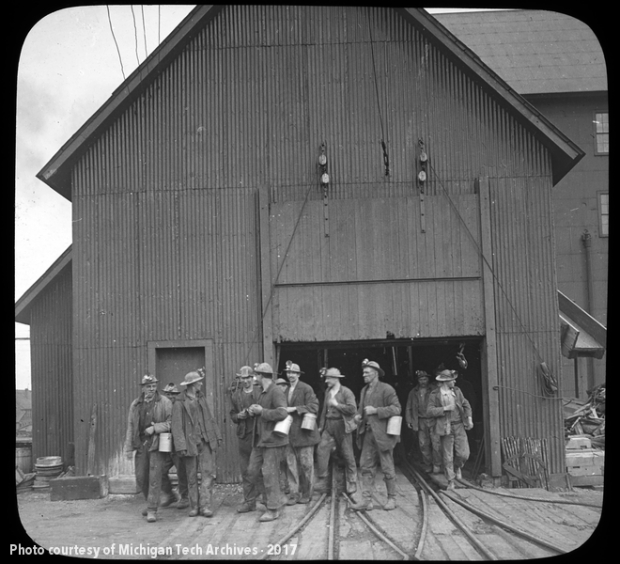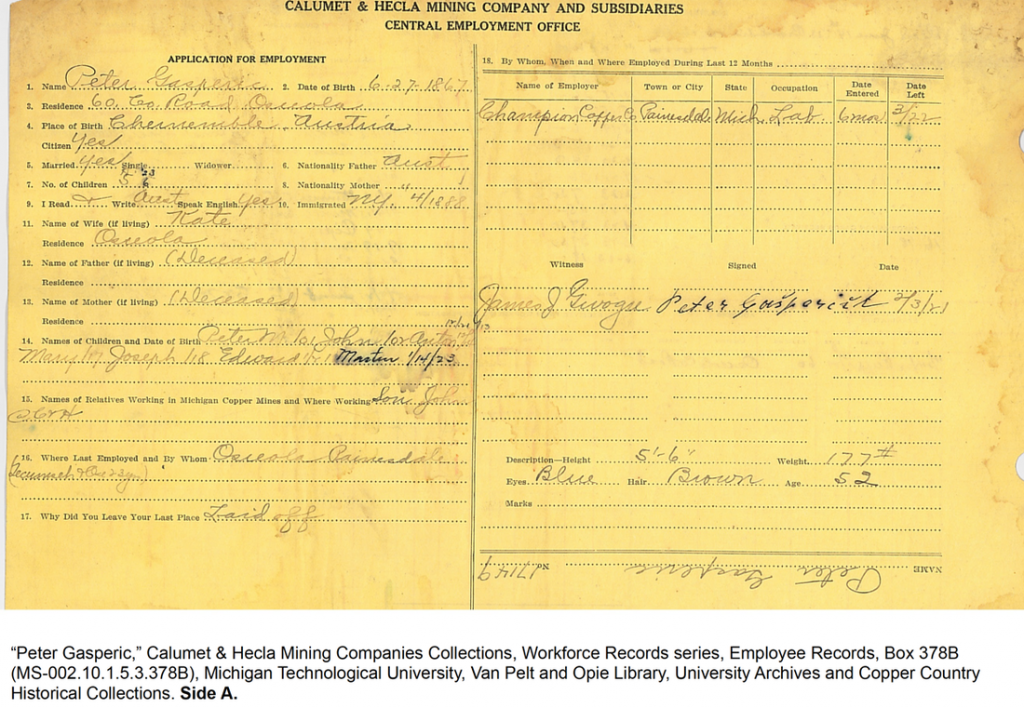
Today’s Flashback Friday serves a special purpose. Our image looks back to 1915 as Calumet and Hecla miners leave the shaft after a long day’s work, hidden below the surface. In the spirit of revealing hidden gems, be it precious metals or the hardworking laborers of the copper mines, we are excited to announce the Michigan Tech Archives, in collaboration with the Keweenaw Time Traveler, has been awarded a Digitizing Hidden Special Collections grant from the Council on Library and Information Resources (CLIR).
This project, called Michigan Miners at Home and Work: Digitizing, Mapping, and Sharing Employee Records, will support 1 Digitization Specialist, 6 Undergraduate students, and 1 Master’s student over 2 years. The project team will work with a subset of records from one of our most prized collections, MS-002: The Calumet and Hecla Mining Companies Collection. The goal of the project is to make a rare collection of 40,000 employee records available online for both academic and public use. This particular subseries of archival records provides valuable insights into the lives of mine company workers and their families unavailable in other public records, including details like the types of work performed, wages, previous employers, as well as notes about injuries and fatalities. The project is made possible through a collaborative effort between the Michigan Tech Archives, the Michigan Tech Social Sciences Department, and the Historical Environments Spatial Analytics Lab.

The Michigan Tech Archives will be working with the Van Pelt and Opie Library’s Manager of Technology and Innovation to create the new Copper Mining Employee Card database, which will be hosted on the library’s Preservica platform. The new database will serve as a sister database to our digital image repository, Copper Country Historical Images. Additionally, this project will provide for further access options to the employee cards by integrating the records into the Keweenaw Time Traveler. Since these employee records contain addresses and family information, the student team working with the Time Traveler will be able to connect each record at the household level with census and city directory information already loaded into the online maps. We anticipate these new resources to be available to the public in early 2022.

Updates about the project will be shared on our social media platforms, the Keweenaw Time Traveler Project Blog, and various local news outlets. Public programming will include several “Night at the Archives” programs which will include special evening hours to discuss the project and how the public and scholars may use the collection. Guests at our public programs can also become citizen historians by transcribing some of the cards and including them in our data set! Program dates will be shared as they become available.
Principal investigators for this $240,014 grant are Sarah Fayen Scarlett (SS), Don Lafreniere (SS), and Lindsay Hiltunen (University Archivist). David Holden is also an important project contributor. The CLIR grant program and its 2019 Awards are made possible by funding from the Andrew W. Mellon Foundation. CLIR is an independent, nonprofit organization that forges strategies to enhance research, teaching, and learning environments in collaboration with libraries, cultural institutions, and communities of higher learning. To learn more, visit www.clir.org or visit them on Facebook and Twitter.
For more information, please contact Lindsay Hiltunen at lehalkol@mtu.edu or call (906) 487-2505.

This is a great project – congratulations!
Thank you, Beth! We are so excited to work on this wonderful collaboration with Social Sciences and the Keweenaw Time Traveler. The dual access on our platform and the spatial index will really enrich this collection. I hope all is well in your neck of the woods!